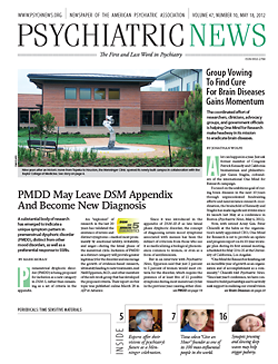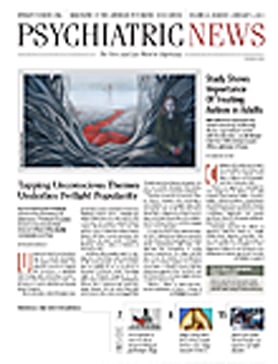A lot can happen in a year. Just ask former member of Congress Patrick Kennedy and California businessman and philanthropist Garen Staglin, cofounders of the international One Mind for Research campaign.
Focused on the ambitious goal of curing brain diseases in the next 10 years through unprecedented fundraising efforts and neuroscience-research coordination, the brainchild of Kennedy and Staglin has made significant strides since its launch last May at a conference in Boston (Psychiatric News, May 6, 2011).
Now, with retired Army Gen. Peter Chiarelli at the helm as the organization’s newly appointed CEO, One Mind for Research is set to provide an update and progress report on its 10-year strategic plan during its first annual meeting, scheduled for May 23 to 25 at the University of California, Los Angeles.
“One Mind for Research is finishing out an incredible year of growth as an organization and of accomplishment as a community,” Chiarelli told Psychiatric News. “Since last year’s conference, we have continued to build partnerships and to actively seek support in realizing our overall vision of a world free of brain disease. Having focused our efforts on a 10-year horizon, we believe we can make monumental gains in eradicating brain disease and eliminating its stigma within this time.”
Toward that goal, One Mind for Research has launched several collaborative research efforts and secured major funding commitments from both the private and public sectors, including a second $50,000 grant from the American Psychiatric Foundation (APF).
“The American Psychiatric Foundation is pleased to continue our support of the One Mind for Research campaign,” said APF Executive Director Paul Burke. “We applaud this initiative and the progress that is being made on the campaign’s 10-year strategic plan.”
Last November, the organization launched an initiative in partnership with the New York Academy of Sciences dedicated to improving the productivity of biomedical research and development for Alzheimer’s disease and dementia. That same month, Janssen Pharmaceuticals Inc. announced the commitment of $3 million in direct and challenge contributions to support the efforts of One Mind for Research.
The organization has also collaborated with the American Brain Coalition and the Neuroscience Information Framework in developing a comprehensive global listing of biorepositories for brain-related disorders and conditions.
And One Mind for Research’s participation in the Traumatic Brain Injury and Posttraumatic Stress Disorder Disease Networks Alliance is focused on trying to advance understanding of the nature and treatment of brain disorders that affect a disproportionate number of service members and veterans.
Yet despite having so many first-year accomplishments to celebrate, One Mind for Research Development Director Jonathan Sack told Psychiatric News that attendees at the group’s conference should not expect a “business-as-usual” annual meeting.
According to Sack, the conference is structured as a series of panel discussions during which international experts in neuroscience, mental health advocacy, technology, and economics will have roughly five minutes each to discuss their current work as it relates to brain research, followed by in-depth, outcomes-focused sessions moderated by the panel chairs and in conversation with the audience.
In addition to Kennedy, Staglin, and Chiarelli, this year’s conference speakers include Academy Award–nominated actress and Bring Change 2 Mind Chair Glenn Close, National Institute of Mental Health Director Thomas Insel, M.D., and former Harvard University Provost Steven Hyman, M.D., director of the Stanley Center for Psychiatric Research at the Broad Institute of MIT and Harvard and chair of One Mind for Research’s Scientific Planning Committee.
“We want to lead the fight against brain disease just like the American Cancer Society has been leading the fight against cancer,” said Chiarelli. “We want it to be common and acceptable practice for everyone to get a ‘checkup from the neck up’ and for our families and communities to openly accept and address the findings. One Mind for Research is now organized better than ever to take on this crucial mission, and we look forward to gathering at UCLA with our colleagues, partners, and supporters to further our efforts.”


